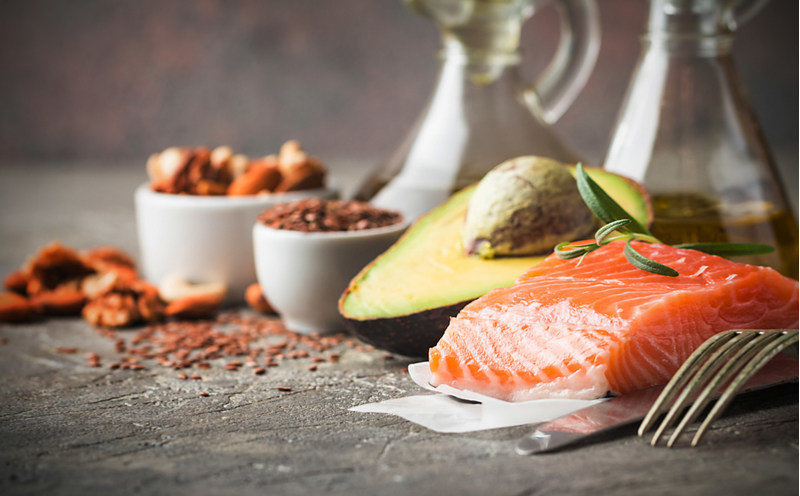Sugar Addiction: 6 Ways to Quit The Sweet Stuff for Good

Sugar is ubiquitous. And while all sugar isn’t all bad for everyone, people consume sweets at an alarming rate.
Many find that when they try to quit sugar, they’re struck by such strong cravings and withdrawals that it doesn’t feel worth it.
Unfortunately, sugar is a highly inflammatory food that can worsen diseases and conditions, harming the gut health and lowering immunity. So, how do you really quit and stick with it?
Why We Crave Sugar So Much
Your sugar cravings have less to do with taste and everything to do with how it impacts you on a chemical level.
Many claim that sugar can be as addictive as a drug. There’s some truth to this: Research shows that sugar and other junk foods can cause activity in the same areas of the brain related to drug addiction. (1, 2)
Yet sugar’s damaging effects often go overlooked because they don’t pose an immediate threat. But that doesn’t make sugar harmless.
How Sugar Addiction Happens
The brain is wired to function in specific ways. Neurotransmitters, like dopamine, are chemical messengers that help to regulate body processes and moods. Dopamine is tied to the brain’s “reward system,” and is released after certain behaviors or actions—eating included. (3)
But certain stimulants, including sugar, can cause a higher level of dopamine to flood the brain. This results in a quicker, more intense reward, but the effects don’t last forever. When levels begin to fall, the brain remembers how great it felt after that dopamine high and craves that feeling.
Sugar addiction can definitely be more than just a strong desire to eat something because it tastes good. Chemicals in your brain send out strong messages, demanding to be rewarded. With no ability to resist, the dopamine highs keep coming, and the addiction grows stronger. (4, 5)
Many people also confuse cravings with hunger, and learning to recognize the difference between the two is much more complex than just not eating when you’re not hungry.
Common dietary advice to just “stop snacking” or cut back on sugar intake doesn’t consider brains that have come to depend on sugar for dopamine boosts.
Why You Can’t Quit Sugar Cold Turkey

Without proper preparation, attempts to quit sugar will result in failure again and again. This is because quitting sugar and other junk food cold turkey will result in withdrawal.
When someone quits sugar or other junk food, their bodies often struggle to adapt to a sugar-free diet without support.
Quitting sugar can be difficult when everywhere there are reminders of the sugary treats you usually eat, as well as daily routines and brain cravings for that dopamine boost.
If you do manage to power through your strong cravings, you’re going to feel the effects of the dopamine loss for a while, sometimes for a few days but sometimes for as long as a few weeks.
Sugar withdrawal symptoms can include headaches, body aches, tremors, shaking, and digestive changes. (6)
How Sugar Sabotages Your Health
Even if we understand that sugar is addictive and that we might be a little too reliant on it, you may lack the motivation to quit. After all, how bad can sweets really be?
But when we get right down to it, sugar is contributing to a major health crisis in the U.S. and needs to be addressed.
Added sugars make up 17 percent of the average daily calories for adults and 14 percent for children, yet most dietary guidelines recommend that this number be lower than 10 percent. (7, 8) Even then, Paleo nutrition would limit sugars—refined or natural—to significantly less than that.
Sugar and sweets contribute to numerous health problems, such as:
- Inflammation (9)
- Heart disease (10)
- Cancer (11)
- Addiction (12)
- Obesity (13)
- Visceral fat (14)
- Acne (15)
- Metabolic syndrome (16)
- Increased triglyceride levels (17)
- Insulin resistance (18)
- Type 2 diabetes (19)
- Dementia (20)
- Gout (21)
- Leptin resistance (the hormone that regulates appetite) (22)
- Depression (23)
- Suppressed energy levels (24)
- Non-alcoholic fatty liver disease (25)
- Kidney disease (26)
- Dental problems (27)
6 Ways to Successfully Beat Your Sugar Cravings
It’s possible to beat sugar cravings, but it will take some planning ahead and the motivation to fight more than a simple cookie craving.
1. Eat More Protein

Sometimes we crave sugar because our actual blood sugar levels are low. The body can send out signals to consume carbs, and often this gets translated into cravings for sugar since sugar is easily broken down into glucose.
Protein can be converted to glucose if the body really needs it. More importantly, protein can help to stabilize blood sugar levels and promote balance, especially when eaten with each meal and snack.
Eating quality protein can reduce cravings and lead to natural weight loss. (28)
2. Drink Water
Sometimes food cravings are actually a misunderstood signal for thirst. Most people don’t get enough water, so taking a moment to drink some water and seeing if it settles the craving can be a good first-line approach.
Optimizing water intake can help lead to natural weight loss and promote feelings of fullness, which can counterbalance cravings. (29)
3. Eat Healthy Fats

Sugar cravings are going to come on strong, especially when you’re so hungry you can’t think straight. Eating healthy fats throughout the day can promote feelings of fullness and reduce the likelihood of getting that “hangry” feeling.
Unless carbs are paired with quality fat and protein, they can fuel sugar cravings instead of abating them.
4. Plan Ahead
If you don’t plan your meals ahead of time, you’re more likely succumb to your sugar cravings. This is primarily because one of the few constants is that wherever you go, there will be dessert, sugar, sweets, and treats. Protein-rich snacks and healthy fats are harder to find in a pinch.
Pack snacks to take with you and eat a quality meal if you’re going to be somewhere where healthy options aren’t readily available.
5. Manage Your Stress

If you’re massively stressed out, your sugar cravings will be more intense. This is because the brain will want that dopamine boost to counterbalance the negative feelings associated with being stressed, burnt out, or run down.
Finding healthy ways to cope or to decrease the mental burden is essential not only for beating sugar cravings but for overall wellness.
Deep breathing, meditation, and yoga are all excellent stress busters that are backed by research. (30, 31) Even going for a simple walk to help clear your mind can reduce stress levels and promote natural weight loss. (32)
6. Participate Fully While Eating
When we eat on the go in a stressed-out manner, it’s easier to eat far more food than we really need. When we slow down and focus on chewing our food, we’re able to improve both the body’s ability to digest and our appreciation for what we are eating. This also prevents us from overeating, since you’re more likely to feel satisfied when you’re taking the time to fully enjoy your meal.
Mindful eating can help to decrease food addictions and lead to natural weight loss and a healthier relationship with food. (33, 34)
Bottom Line
It’s possible to beat your sugar cravings and to develop a healthier relationship with food, but it takes planning ahead and building healthy, long-term habits.
For more healthy tips, check out 4 Sneaky Ways to Cut Out Sugar.
The post Sugar Addiction: 6 Ways to Quit The Sweet Stuff for Good appeared first on PaleoPlan.
from PaleoPlan https://ift.tt/2FJHEBn
Entry Published : November 28, 2018 at 07:36AM
EntryContent :

Sugar is ubiquitous. And while all sugar isn’t all bad for everyone, people consume sweets at an alarming rate.
Many find that when they try to quit sugar, they’re struck by such strong cravings and withdrawals that it doesn’t feel worth it.
Unfortunately, sugar is a highly inflammatory food that can worsen diseases and conditions, harming the gut health and lowering immunity. So, how do you really quit and stick with it?
Why We Crave Sugar So Much
Your sugar cravings have less to do with taste and everything to do with how it impacts you on a chemical level.
Many claim that sugar can be as addictive as a drug. There’s some truth to this: Research shows that sugar and other junk foods can cause activity in the same areas of the brain related to drug addiction. (1, 2)
Yet sugar’s damaging effects often go overlooked because they don’t pose an immediate threat. But that doesn’t make sugar harmless.
How Sugar Addiction Happens
The brain is wired to function in specific ways. Neurotransmitters, like dopamine, are chemical messengers that help to regulate body processes and moods. Dopamine is tied to the brain’s “reward system,” and is released after certain behaviors or actions—eating included. (3)
But certain stimulants, including sugar, can cause a higher level of dopamine to flood the brain. This results in a quicker, more intense reward, but the effects don’t last forever. When levels begin to fall, the brain remembers how great it felt after that dopamine high and craves that feeling.
Sugar addiction can definitely be more than just a strong desire to eat something because it tastes good. Chemicals in your brain send out strong messages, demanding to be rewarded. With no ability to resist, the dopamine highs keep coming, and the addiction grows stronger. (4, 5)
Many people also confuse cravings with hunger, and learning to recognize the difference between the two is much more complex than just not eating when you’re not hungry.
Common dietary advice to just “stop snacking” or cut back on sugar intake doesn’t consider brains that have come to depend on sugar for dopamine boosts.
Why You Can’t Quit Sugar Cold Turkey

Without proper preparation, attempts to quit sugar will result in failure again and again. This is because quitting sugar and other junk food cold turkey will result in withdrawal.
When someone quits sugar or other junk food, their bodies often struggle to adapt to a sugar-free diet without support.
Quitting sugar can be difficult when everywhere there are reminders of the sugary treats you usually eat, as well as daily routines and brain cravings for that dopamine boost.
If you do manage to power through your strong cravings, you’re going to feel the effects of the dopamine loss for a while, sometimes for a few days but sometimes for as long as a few weeks.
Sugar withdrawal symptoms can include headaches, body aches, tremors, shaking, and digestive changes. (6)
How Sugar Sabotages Your Health
Even if we understand that sugar is addictive and that we might be a little too reliant on it, you may lack the motivation to quit. After all, how bad can sweets really be?
But when we get right down to it, sugar is contributing to a major health crisis in the U.S. and needs to be addressed.
Added sugars make up 17 percent of the average daily calories for adults and 14 percent for children, yet most dietary guidelines recommend that this number be lower than 10 percent. (7, 8) Even then, Paleo nutrition would limit sugars—refined or natural—to significantly less than that.
Sugar and sweets contribute to numerous health problems, such as:
- Inflammation (9)
- Heart disease (10)
- Cancer (11)
- Addiction (12)
- Obesity (13)
- Visceral fat (14)
- Acne (15)
- Metabolic syndrome (16)
- Increased triglyceride levels (17)
- Insulin resistance (18)
- Type 2 diabetes (19)
- Dementia (20)
- Gout (21)
- Leptin resistance (the hormone that regulates appetite) (22)
- Depression (23)
- Suppressed energy levels (24)
- Non-alcoholic fatty liver disease (25)
- Kidney disease (26)
- Dental problems (27)
6 Ways to Successfully Beat Your Sugar Cravings
It’s possible to beat sugar cravings, but it will take some planning ahead and the motivation to fight more than a simple cookie craving.
1. Eat More Protein

Sometimes we crave sugar because our actual blood sugar levels are low. The body can send out signals to consume carbs, and often this gets translated into cravings for sugar since sugar is easily broken down into glucose.
Protein can be converted to glucose if the body really needs it. More importantly, protein can help to stabilize blood sugar levels and promote balance, especially when eaten with each meal and snack.
Eating quality protein can reduce cravings and lead to natural weight loss. (28)
2. Drink Water
Sometimes food cravings are actually a misunderstood signal for thirst. Most people don’t get enough water, so taking a moment to drink some water and seeing if it settles the craving can be a good first-line approach.
Optimizing water intake can help lead to natural weight loss and promote feelings of fullness, which can counterbalance cravings. (29)
3. Eat Healthy Fats

Sugar cravings are going to come on strong, especially when you’re so hungry you can’t think straight. Eating healthy fats throughout the day can promote feelings of fullness and reduce the likelihood of getting that “hangry” feeling.
Unless carbs are paired with quality fat and protein, they can fuel sugar cravings instead of abating them.
4. Plan Ahead
If you don’t plan your meals ahead of time, you’re more likely succumb to your sugar cravings. This is primarily because one of the few constants is that wherever you go, there will be dessert, sugar, sweets, and treats. Protein-rich snacks and healthy fats are harder to find in a pinch.
Pack snacks to take with you and eat a quality meal if you’re going to be somewhere where healthy options aren’t readily available.
5. Manage Your Stress

If you’re massively stressed out, your sugar cravings will be more intense. This is because the brain will want that dopamine boost to counterbalance the negative feelings associated with being stressed, burnt out, or run down.
Finding healthy ways to cope or to decrease the mental burden is essential not only for beating sugar cravings but for overall wellness.
Deep breathing, meditation, and yoga are all excellent stress busters that are backed by research. (30, 31) Even going for a simple walk to help clear your mind can reduce stress levels and promote natural weight loss. (32)
6. Participate Fully While Eating
When we eat on the go in a stressed-out manner, it’s easier to eat far more food than we really need. When we slow down and focus on chewing our food, we’re able to improve both the body’s ability to digest and our appreciation for what we are eating. This also prevents us from overeating, since you’re more likely to feel satisfied when you’re taking the time to fully enjoy your meal.
Mindful eating can help to decrease food addictions and lead to natural weight loss and a healthier relationship with food. (33, 34)
Bottom Line
It’s possible to beat your sugar cravings and to develop a healthier relationship with food, but it takes planning ahead and building healthy, long-term habits.
For more healthy tips, check out 4 Sneaky Ways to Cut Out Sugar.
The post Sugar Addiction: 6 Ways to Quit The Sweet Stuff for Good appeared first on PaleoPlan.
via IFTTT
No comments: